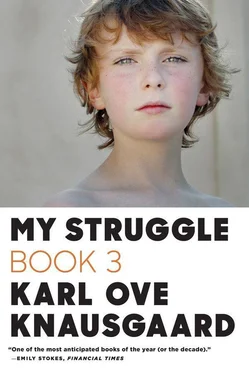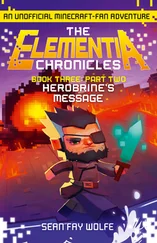The very thought of Dad, the fact that he existed, caused fear to pump through my body.
I turned to Geir, who sauntered over with my plastic bag dangling from one hand. Down below, a child resembling Geir Håkon’s little brother was playing in the sand by the concrete barriers between our road and Elgstien. A car came up the hill, encased in itself like an insect, the black windshield its expressionless eye, turned left, and disappeared from view.
“We can’t go straight down anyway,” I said. “If someone’s seen the smoke they’ll put two and two together.”
Why had we done it? Why, oh why?
“They can see us here, too,” I said. “Come on!”
We descended the tree-clad slope beneath us. When we were at the bottom we stumbled homeward through the forest, which was perhaps ten meters from the road. We stopped by the big spruce beside the wide, shallow, turbid stream where all the colors were green and murky, its bark stained with sticky resin, not unlike burned sugar in color, with the pungent smell of juniper. Between the slender trunks of the nearby rowan trees you could see our house. I glanced at my hands to see if there was any soot on them. Nothing. But there was a faint burned smell, so I plunged them in the water and rubbed them dry on my trousers.
“What shall we do with the box of matches?” I said.
Geir shrugged.
“Hide it, I s’pose.”
“If they find it, don’t say anything about me,” I said. “About what we did.”
“Course not,” Geir said. “Here’s the bag, by the way.”
We started to walk up to the road.
“Are you going to set fire to anything else today?” I said.
“I don’t think so,” he said.
“Not even with Leif Tore?”
“Maybe tomorrow,” he said. And his face brightened. “Should I take the matches to school with me, what do you think?”
“Are you out of your mind?!”
He laughed. We reached the road, and crossed it.
“See you!” he said, running up the hill.
I passed Mom’s VW, parked on a patch of scorched yellow grass just outside the fence, beside the gray garbage can, and stepped onto the gravel. I felt the fear rising in me again. Dad’s red car gleamed in the fierce sunshine. I looked down, unwilling to meet the gaze that might await me in the kitchen window. The mere thought of it sent waves of despair shooting through me. When I reached the front doorstep and couldn’t be seen from the windows on the first floor I clasped my hands together and closed my eyes.
Almighty God, I uttered silently. Let me get through this and I promise I’ll never do anything wrong again. Never ever. I promise by all that is holy. Amen.
I opened the door and went in.
It was cooler in the hall than outside, and after the bright sunshine, almost completely dark. The smell of stew lay heavy in the air. I bent down and untied my shoelaces, carefully placed my shoes by the wall, slunk upstairs, trying to make my face appear normal, and stopped on the landing in a quandary. What would I normally do, go up to my room right away or go into the kitchen to see if dinner was ready?
Voices, the clinking of cutlery on plates.
Was I late?
Had they already started eating?
Oh no, oh no.
What should I do?
The notion of turning on my heel, calmly walking outside, up the hill and into the forest, never to return, came as a joyful clarion call amid all the tension.
Then they would be sorry.
“Is that you, Karl Ove?” Dad shouted from the other side of the door.
I swallowed, shook my head, blinked a few times, and took a deep breath.
“Yes,” I said.
“We’re eating!” he shouted. “Come on in!”
God had heard my prayer and done as I asked. Dad was in a good mood, I could see that as soon as I entered, he was leaning back in the chair with his legs stretched out, his arms wide apart, and his eyes glinting with mischief.
“What was so good that you lost track of time?” he said.
I sat down next to Yngve. Dad was sitting at the end to the right, Mom at the end to the left. The Formica table with a gray-and-white marble pattern and gray edging, shiny legs, and gray rubber feet was set: brown dinner plates, green glasses with Duralex written on the bottom, a basket of crispbread, a big pot from which protruded a wooden ladle.
“Been out with Geir,” I said, leaning forward to check if there was a piece of meat in the ladle I lifted out a moment later.
“Where did you go then?” Dad asked, lifting his fork to his mouth. Something pale yellow, perhaps onion, was lodged in his beard, on his chin.
“Down to the forest.”
“Oh yes?” he said, chewing several times and swallowing, his eyes trained on me the whole time.
“I thought I saw you on your way up the hill?”
I sat transfixed.
“It wasn’t us,” I said at length.
“Nonsense,” he said. “What devilry were you up to there since you won’t admit that’s where you were?”
“But we weren’t on the hill,” I said.
Mom and Dad exchanged glances. Dad said no more. I could move my hands again. I filled my plate and started eating. Dad helped himself to another portion, still with the same apparent gliding movements. Yngve had finished eating, and sat next to me looking down in front of him, one hand resting on his thigh, the other on the edge of the table.
“And how was the schoolboy’s first day?” Dad asked. “Did you get any homework?”
I shook my head.
“Was the teacher nice?”
I nodded.
“What was her name again?”
“Helga Torgersen,” I said.
“That’s right,” Dad said. “She lives … did she say?”
“In Sandum,” I said.
“She seemed so lovely,” Mom said. “Young and pleased to be there.”
“But we got there late,” I said, relief spreading through my body at the turn the conversation had taken.
“Oh?” Dad said, looking at Mom. “You didn’t mention that?”
“We got lost,” she said. “So we arrived a few minutes late. But I don’t think we missed anything important. Did we, Karl Ove?”
“No,” I mumbled.
“Don’t talk with your mouth full,” Dad said.
I swallowed.
“All right,” I said.
“And what about you, Yngve?” Dad said. “Any surprises on the first day?”
“No,” Yngve said, sitting up straight in his chair.
“You have soccer practice today, don’t you?” Mom said.
“Yep,” Yngve said.
He had changed teams, had left Trauma, which was the island team where all his friends played, with its fantastic uniform, blue shirts with a white diagonal stripe, white shorts and blue-and-white socks, for Saltrød, a club in a little town just across Tromøya Sound. Today was his first session there. He would have to cycle over the bridge alone, which he had never done before, and all the way to the training ground. Five kilometers, he had said it was.
“Didn’t anything else happen at school today then, Karl Ove?” Dad said.
I nodded and swallowed.
“We’re going to have a swimming class,” I said. “Six lessons. At another school.”
“There you go,” Dad said, running the back of his hand across his mouth, but without removing the ribbon of onion from his beard. “That’s not a bad idea. You can’t live on an island and not be able to swim.”
“And it’s free, too,” Mom said.
“But I need a swimming cap,” I said. “Everyone does. And maybe some new swimming trunks? Not shorts, but the kind … well.”
“We can find a cap for you. But your shorts will have to do you for now,” Dad said.
“And goggles,” I said.
“Goggles as well?” Dad said, looking at me with a teasing expression. “We’ll have to see about that.”
Читать дальше












